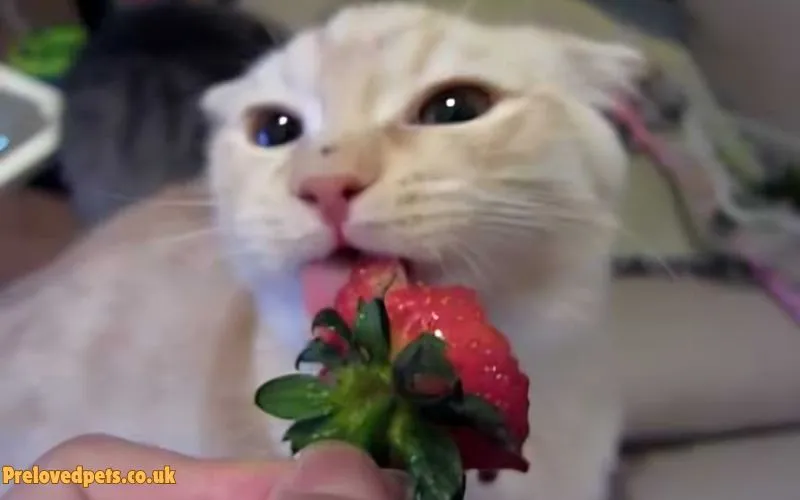Cats are known for their particular dietary needs and preferences, often leaving pet owners puzzled about what is safe to include in their feline friend’s diet. One common question that arises is, “Can cats eat strawberries?” While cats are obligate carnivores, meaning their primary diet consists of meat, the inclusion of fruits and vegetables can sometimes provide nutritional benefits or simply act as a tasty treat. This article will explore whether strawberries are safe for cats to consume, the potential benefits and risks, and guidelines for introducing strawberries to your cat’s diet.
The Basics of Feline Nutrition
Before diving into the specifics of strawberries, it is essential to understand the fundamental nutritional needs of cats. Cats require a diet high in animal-based proteins and fats, which provide essential amino acids like taurine, arachidonic acid, and vitamins such as vitamin A and B12. These nutrients are crucial for maintaining healthy muscles, skin, and overall bodily functions. Carbohydrates are not a necessary component of a cat’s diet and should be limited.
Are Strawberries Safe for Cats?
Strawberries, a popular and nutritious fruit for humans, are generally safe for cats in small quantities. They are not toxic or harmful to cats, which means that if your feline friend happens to nibble on a strawberry, there is no need for immediate concern. However, strawberries should be given as an occasional treat rather than a regular part of their diet.
Nutritional Profile of Strawberries
Strawberries are packed with vitamins, minerals, and antioxidants that are beneficial to humans, and some of these nutrients can also be advantageous for cats. Here’s a brief overview of the nutritional components found in strawberries:
- Vitamin C: Boosts the immune system and acts as an antioxidant.
- Manganese: Supports healthy bones and metabolic functions.
- Folate: Essential for cell function and tissue growth.
- Potassium: Helps maintain fluid balance and proper nerve and muscle function.
- Dietary Fiber: Aids in digestion and prevents constipation.
While these nutrients are beneficial, it is important to remember that cats have different nutritional requirements than humans and do not need fruits and vegetables to meet their dietary needs.
Benefits of Strawberries for Cats
Although strawberries are not a necessary component of a cat’s diet, they can offer some benefits when given in moderation:

- Hydration: Strawberries have a high water content, which can help keep your cat hydrated, especially during hot weather.
- Antioxidants: The antioxidants in strawberries can help combat free radicals and reduce oxidative stress, potentially benefiting overall health and longevity.
- Low-Calorie Treat: Strawberries are low in calories, making them a suitable treat for overweight or obese cats when given in small amounts.
- Variety and Enrichment: Introducing new foods like strawberries can provide mental stimulation and enrichment, which is important for a cat’s well-being.
See Also: Can Dogs Eat Tomatoes?
Potential Risks of Feeding Strawberries to Cats
While strawberries are generally safe for cats, there are some potential risks to be aware of:
- Digestive Upset: Cats have sensitive stomachs, and introducing new foods can sometimes lead to digestive issues such as vomiting, diarrhea, or constipation. It is crucial to monitor your cat’s reaction when they first try strawberries.
- Allergic Reactions: Although rare, some cats may be allergic to strawberries. Symptoms of an allergic reaction can include itching, swelling, and difficulty breathing. If you notice any of these signs, discontinue feeding strawberries and consult your veterinarian.
- High Sugar Content: Strawberries contain natural sugars, which can be problematic for cats if consumed in large quantities. Overconsumption of sugar can lead to obesity, dental problems, and even diabetes.
- Choking Hazard: Whole strawberries can be a choking hazard, especially for small cats or kittens. It is best to cut strawberries into small, manageable pieces before offering them to your cat.
How to Introduce Strawberries to Your Cat’s Diet
If you decide to introduce strawberries to your cat’s diet, follow these guidelines to ensure their safety and enjoyment:
- Consult Your Veterinarian: Before introducing any new food, it is always best to consult with your veterinarian to ensure it is safe for your cat.
- Start Small: Begin by offering a small piece of strawberry to see how your cat reacts. Observe for any signs of digestive upset or allergic reaction.
- Wash Thoroughly: Ensure that the strawberries are thoroughly washed to remove any pesticides or chemicals that could be harmful to your cat.
- Cut into Small Pieces: Cut the strawberry into small, bite-sized pieces to prevent choking and make it easier for your cat to eat.
- Moderation is Key: Offer strawberries as an occasional treat rather than a regular part of your cat’s diet. A small piece once or twice a week is sufficient.
Preparing Strawberries for Cats
To ensure that strawberries are safe and enjoyable for your cat, proper preparation is essential. Here’s a step-by-step guide:
- Selection: Choose fresh, ripe strawberries. Avoid strawberries that are overly ripe, moldy, or have any signs of spoilage.
- Cleaning: Rinse the strawberries thoroughly under cold water to remove dirt, pesticides, and any potential contaminants. Organic strawberries are preferable as they are less likely to contain harmful pesticides.
- Cutting: Remove the green leafy tops and stems, as these can be difficult for cats to digest. Cut the strawberries into small, bite-sized pieces to reduce the risk of choking.
- Serving: Offer a small piece to your cat and monitor their reaction. If your cat enjoys the strawberry and shows no signs of adverse effects, you can occasionally offer more pieces as a treat.
Alternatives to Strawberries
If your cat does not take to strawberries or if you are looking for other healthy treat options, consider these alternatives:
- Blueberries: Another safe and antioxidant-rich fruit, blueberries can be given in moderation.
- Pumpkin: Canned pumpkin (without added sugar or spices) can aid in digestion and is often recommended for cats with digestive issues.
- Cooked Vegetables: Small amounts of cooked carrots, peas, or green beans can be a healthy addition to your cat’s diet.
- Commercial Cat Treats: There are many commercial cat treats formulated to meet the specific dietary needs of cats. Look for treats with high-quality ingredients and avoid those with excessive fillers or artificial additives.
FAQs
Q: Can kittens eat strawberries?
It is generally best to avoid giving strawberries to kittens. Their digestive systems are still developing, and they may be more sensitive to new foods. Stick to a high-quality kitten food and consult your veterinarian before introducing any new treats.
Q: How often can I give my cat strawberries?
Strawberries should be given as an occasional treat rather than a regular part of your cat’s diet. A small piece once or twice a week is sufficient.
Q: Are strawberry leaves and stems safe for cats?
No, the leaves and stems of strawberries can be difficult for cats to digest and may cause gastrointestinal upset. Always remove the green leafy tops and stems before offering strawberries to your cat.
Q: What should I do if my cat has an adverse reaction to strawberries?
If your cat shows signs of an adverse reaction, such as vomiting, diarrhea, itching, or difficulty breathing, discontinue feeding strawberries and contact your veterinarian immediately.
Q: Can I give my cat strawberry-flavored products?
It is best to avoid giving your cat any strawberry-flavored products, as they may contain artificial flavors, sugars, and other ingredients that are not suitable for cats.
Q: Do cats even like strawberries?
Some cats may enjoy the taste and texture of strawberries, while others may not be interested. Cats have unique preferences, and it may take some experimentation to determine whether your cat likes strawberries.
Conclusion
Can cats eat strawberries? Yes, cats can eat strawberries in moderation as an occasional treat. While strawberries are not a necessary part of a cat’s diet, they can offer some benefits such as hydration, antioxidants, and variety. However, it is crucial to be aware of the potential risks, including digestive upset, allergic reactions, high sugar content, and choking hazards. Always consult your veterinarian before introducing any new foods to your cat’s diet and monitor your cat’s reaction closely. By following these guidelines, you can safely incorporate strawberries and other fruits into your cat’s diet, providing them with a diverse and enriching eating experience.
Ultimately, while strawberries can be a fun and healthy treat for your cat, their primary diet should consist of high-quality animal-based proteins and fats to ensure they receive all the essential nutrients they need to thrive. As with any treat, moderation is key, and it is important to prioritize your cat’s overall health and well-being in every dietary decision you make.




